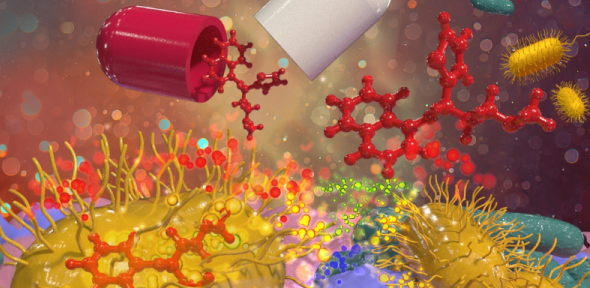
Submitted by Sophie Milbourne on Tue, 05/03/2024 - 00:00
Our gut microbiome is home to a diverse mix of microorganisms that are delicately balanced to preserve many aspects of our health including digestion, immunity and even our mental wellbeing. There are known factors that can impact our microscopic companions such as diet, lifestyle, antibiotic use and environmental exposures. However, a new report from MRC Toxicology Unit researchers has shown that COVID vaccinations are not one of these factors that negatively affects this stability.
We have a harmonious relationship with the trillions of bacterial species that live in our gut. They receive nutrients from the food we eat and in return they help us in many ways. Two main examples are the support they provide for our digestive and immune systems. Bacterial species can digest and breakdown complex carbohydrates and fibres which we cannot, allowing us to absorb more nutrients from our diet. A healthy gut microbiome can also help regulate our immune system by providing a barrier against harmful bacteria, called pathogens. This is why it is important to maintain a happy and healthy microbiome for our overall health.
Since the COVID-19 pandemic, previous studies have shown how, once infected with the virus, the gut microbiome can be altered. This change can lead to a decrease in beneficial bacterial species such as, Bacteroides and Bifidobacterium spp. and Lachnospiraceae, allowing for pathogenic species to overgrow in their place, causing disease. Although the underlying cause of gut microbiome disturbance from a COVID-19 infection isn’t fully understood, this proven imbalance is what led the researchers to ask if the COVID-19 vaccinations could also negatively impact our gut microbiome in the short, and long term, after vaccination.
So, how did the researchers investigate the effects of the different COVID-19 vaccinations on our microbiome? They collected fecal samples from healthy and immunocompromised individuals at three different time points around receiving their COVID-19 vaccinations. One sample was provided prior to being vaccinated to give an insight into the individuals baseline gut microbiome. The second sample was provided two to three days after vaccination to see what happened to the microbiome during peak immune system activation. Thirdly, a sample was given sixteen to twenty-eight days after vaccination to determine if the microbiome had restored or maintained itself. Any genes present in the samples were extracted and read, using a method called shotgun metagenomic sequencing, allowing the researchers to identify which bacterial species were present in an individual’s sample at each time point.
The design of this study included those who are immunocompromised, meaning an individual who has a weakened or impaired immune system, which makes them more vulnerable to infections and illness. As explained by Dr Kiran Patil, Group Leader at the MRC Toxicology Unit, and lead author on this study, this was to “provide a unique opportunity to explain if the COVID-19 vaccines directly influence gut microbiome regulation in cases of incomplete immunity”.
The results published in the journal Life Science Alliance on 5th February showed that there were minimal, if any, changes in the gut microbiome of those who took part in this study. The COVID-19 vaccines did not change the makeup of the microbiome across the different time points; the levels of individual bacterial species did not change; and the function of the microbiome was not affected by the vaccines – the bacterial species were still producing the same molecules as expected for signalling and metabolism. These findings demonstrate that the gut microbiome remained stable after the COVID-19 vaccinations were administered.
This study, and others like it, are important as they can reassure the public of vaccine and microbiome stability. As COVID-19 transmission continues, these results have a positive impact on public health management and have the potential to increase vaccine acceptance across the population.
‘Stability of gut microbiome after COVID-19 vaccination in healthy and immuno-compromised individuals’ was published in the journal Life Science Alliance on 5th February 2024. Read the full publication here.
Written by Charlotte Miller.

